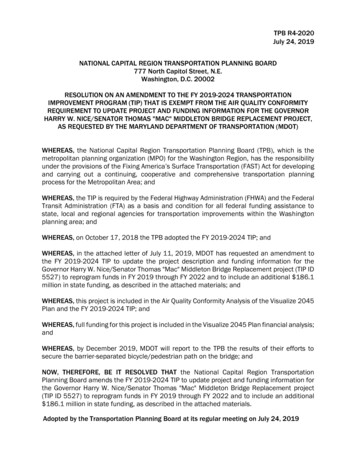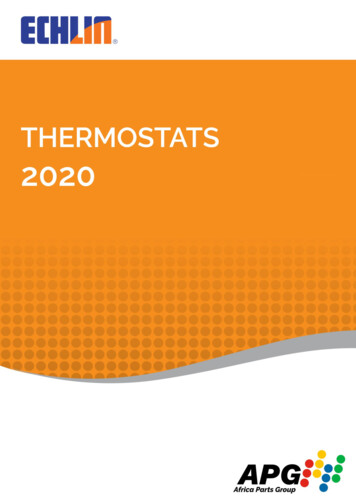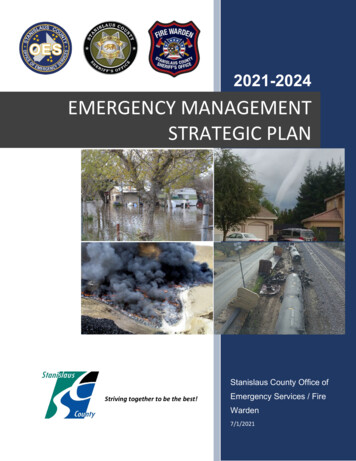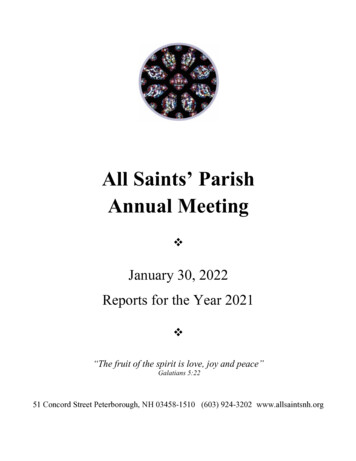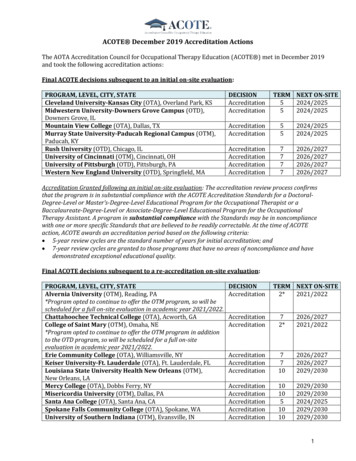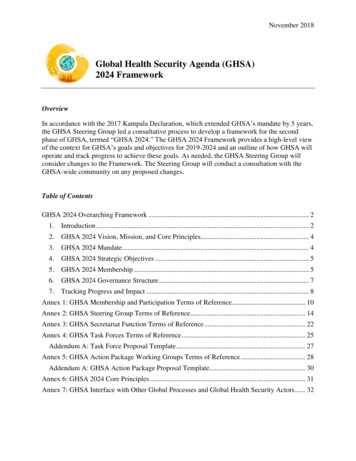
Transcription
November 2018Global Health Security Agenda (GHSA)2024 FrameworkOverviewIn accordance with the 2017 Kampala Declaration, which extended GHSA’s mandate by 5 years,the GHSA Steering Group led a consultative process to develop a framework for the secondphase of GHSA, termed “GHSA 2024.” The GHSA 2024 Framework provides a high-level viewof the context for GHSA’s goals and objectives for 2019-2024 and an outline of how GHSA willoperate and track progress to achieve these goals. As needed, the GHSA Steering Group willconsider changes to the Framework. The Steering Group will conduct a consultation with theGHSA-wide community on any proposed changes.Table of ContentsGHSA 2024 Overarching Framework . 21. Introduction . 22. GHSA 2024 Vision, Mission, and Core Principles. 43. GHSA 2024 Mandate . 44. GHSA 2024 Strategic Objectives . 55. GHSA 2024 Membership . 56. GHSA 2024 Governance Structure . 77. Tracking Progress and Impact . 8Annex 1: GHSA Membership and Participation Terms of Reference . 10Annex 2: GHSA Steering Group Terms of Reference. 14Annex 3: GHSA Secretariat Function Terms of Reference . 22Annex 4: GHSA Task Forces Terms of Reference . 25Addendum A: Task Force Proposal Template . 27Annex 5: GHSA Action Package Working Groups Terms of Reference . 28Addendum A: GHSA Action Package Proposal Template. 30Annex 6: GHSA 2024 Core Principles . 31Annex 7: GHSA Interface with Other Global Processes and Global Health Security Actors . 32
GHSA 2024 FrameworkNovember 2018Global Health Security Agenda (GHSA)2024 Framework1. IntroductionCountries continue to face health security threats posed by infectious diseases, whether naturallyoccurring, deliberate, or accidental. Recent infectious disease outbreaks with pandemic potential,like Ebola, Lassa, Zika, MERS-CoV, plague, cholera, and influenza1 are reminders of thesignificance of these threats and the range of gaps in capabilities to prevent, detect, assess, andrespond in countries worldwide. Disease crises can destabilize governments by eroding publictrust and confidence, posing a threat to public order and governance and producing an overallrisk to security and economies. These are cross-sectoral challenges. For example, animal diseaseoutbreaks can threaten food security, disrupt local economics, lead to human disease outbreaks,and erode social fabrics in vulnerable societies. Large outbreaks and pandemics have significantand long-lasting impacts on national, regional, and global economies.While government partners vary in their capacities, resources, political support, partnerships, andengagement in addressing deficiencies in national health security capacity, health ministriesoften lead these efforts through necessary engagements with partners in agriculture, food, animalhealth, defense, security, finance, environment, disaster management, border control, lawenforcement, research, technology, and education sectors.Launched in 2014 by nearly 30 countries and international organizations, the Global HealthSecurity Agenda (GHSA) serves as a catalyst for progress toward the vision of attaining a worldsafe and secure from global health threats posed by infectious diseases. It is a collaborative,multisectoral initiative, bringing together countries, regions, international organizations, and thenon-governmental sector (including the private sector) to accelerate and optimize global healthsecurity. This includes sharing best practices, elevating global health security as a nationalleaders’-level priority, and facilitating national capacity to comply with and adhere to the WorldHealth Organization (WHO) International Health Regulations (IHR), the World Organization forAnimal Health (OIE) international standards and guidelines, the United Nations Security CouncilResolution 1540 and Biological Weapons Convention, and other relevant frameworks thatcontribute to global health security.GHSA emphasizes the need for strong multisectoral engagement, including human and animalhealth, agriculture, security, defense, law enforcement, development assistance, foreign affairs,research, and finance sectors, among others. As of September 2018, 65 participating countriesrepresenting nearly 6 billion people, along with 9 international and regional multilateralorganizations and institutions, and non-governmental sector partners – including over 100 privatecompanies, non-governmental organizations, and academic institutions – are part of GHSA.1For updated information, please see http://www.who.int/emergencies/diseases/en/.2
GHSA 2024 FrameworkNovember 2018The WHO, the Food and Agriculture Organization (FAO), OIE, and the World Bank play a keyrole in advising GHSA efforts. Other international organizations, such as INTERPOL, have beenengaged in GHSA efforts as well. GHSA also leverages the efforts of non-governmental sectorpartners, through the GHSA Consortium (in tandem with local civil society organizations), theGHSA Private Sector Roundtable, and the GHSA Next Generation Network, to implementprogramming, contribute ideas, partnerships, technical support, operational support forgovernment efforts, and advocacy at the national and local level. Further, GHSA seeks toidentify synergies with related initiatives, such as the G7-led Global Partnership Against theSpread of Weapons and Materials of Mass Destruction (Global Partnership) and the JEEAlliance.2GHSA has gained political support for these efforts, with numerous national leaders publiclystating the importance of achieving global health security goals. Since 2014, many countries,political blocs, and organizations have announced financial, technical, and other commitments tosupport other countries’ efforts to build multisectoral capacities. GHSA strengthens partnershipamong a wide range of countries, international organizations, and non-governmentalstakeholders, who have worked together to identify gaps, develop plans to address them, identifyneeded resources, and develop and share best practices and tools. This multifaceted,multisectoral approach is critical to developing the strong health systems and resources that areneeded to achieve national and global health security.At the October 2017 GHSA Ministerial Meeting in Uganda, GHSA member countries presentsupported the “Kampala Declaration” to extend GHSA for an additional five years (to 2024),building upon the Seoul Declaration of 2015. While GHSA partners have achieved progress inincreasing health security capacity in countries around the world3, members acknowledged thatsignificant work remains to fully achieve and sustain health security.This next phase of GHSA, “GHSA 2024,” aims to be strategic and streamlined, have cleargovernance and collaboration structures and processes, increase engagement of the broaderGHSA community, measure progress, and enhance accountability for delivering oncommitments. GHSA 2024 aims to advance a multisectoral approach, support adherence tointernational human and animal health standards, collaboratively identify and address gaps andpriorities in global health security, and advance sustainable financing for global health securityefforts for all relevant sectors. This GHSA 2024 overarching framework lays out a strategicapproach for addressing these priorities over the next five years.23For additional details, see Annex 7: GHSA Interface with Other Global Processes and Global Health Security Actors.For examples of success stories from GHSA partners and contributing organizations, seehttps://www.ghsagenda.org/successes.3
GHSA 2024 Overarching FrameworkNovember 20182. GHSA 2024 Vision, Mission, and Core PrinciplesVisionA world safe and secure from global health threats posed by infectious diseases, whether natural,deliberate, or accidental.MissionTo realize its vision, GHSA 2024 will facilitate effective integration of multisectoral and multistakeholder work to achieve sustainable and measurable results toward common targets for globalhealth security.Core Principles4 tual le progress and impactSustainabilityPartnershipProactivity3. GHSA 2024 MandateMandateGHSA leverages and complements the strengths and resources of multisectoral and multilateralpartners to address priorities and gaps in efforts to build and improve country capacity andleadership in the prevention and early detection of, and effective response to, infectious diseasethreats.It is a political driver that seeks to enhance global health security, and accelerate compliancewith the IHR and adherence to relevant international health security standards, frameworks, andstrategies, including through: Galvanizing tangible commitments at the highest political levels to achieve provincial,national, regional and global health security; Promoting the development and implementation of tools set by the relevant internationalorganizations and mechanisms to achieve commitments at the country-level, as well as inneighboring and border countries; and4For additional details, see Annex 6: Core Principles.4
GHSA 2024 Overarching Framework November 2018Promoting and supporting the mobilization of funds to achieve financial sustainability forhealth security capacities.GoalOver its 5-year mandate, GHSA, working with relevant partners, will actively contribute tonational, regional, and global efforts to support countries in evaluation, planning, resourcemobilization, and implementation of activities that build health security capacity.TargetBy 2024, more than 100 countries that have completed an evaluation of health security capacitywill have undergone planning and resource mobilization to address gaps, and will be in theprocess of implementing activities to achieve impact. These countries will strengthen theircapacities and demonstrate improvements in at least five technical areas to a level of‘Demonstrated Capacity’ or comparable level, as measured by relevant health securityassessments, such as those conducted within the WHO IHR Monitoring and EvaluationFramework.4. GHSA 2024 Strategic ObjectivesGHSA intends to pursue the following strategic objectives and achieve measures of success byDecember 31, 2023:1. Promote international initiatives, instruments, and frameworks relevant for healthsecurity5;2. Increase domestic and international partner financial support for strengthening andmaintaining capacities to prevent, detect and respond to infectious disease outbreaks,including health system strengthening;3. Strengthen and support multi-sectoral engagement and commitment to health security;4. Improve the sharing of best practices and lessons learned, and support the use anddevelopment as needed of relevant tools and mechanisms; and5. Strengthen accountability of all members under GHSA.5. GHSA 2024 MembershipGHSA is a forum that enables a country or organization to actively engage with other committedpartners around the globe to develop and implement mechanisms to build and sustain healthsecurity capacity in all countries. Members contribute and benefit from the tools, lessons learned,5Examples of relevant frameworks in addition to the IHR include, OIE Performance of Veterinary Services (PVS),World Bank Group financing frameworks, WHO’s R&D Blueprint for potentially Epidemic Diseases, theBiological Weapons Convention, and the Global Partnership.5
GHSA 2024 Overarching FrameworkNovember 2018networks, and other resources that this multi-stakeholder coalition brings together, as it workstoward common goals that align with those of other global health security efforts.GHSA membership6 may include any country and non-governmental stakeholder (e.g.,international organization, financial institution, regional organization) that is willing to takeaction to support GHSA’s vision of a world safe and secure from global health threats posed byinfectious diseases, whether natural, deliberate, or accidental.Members bring a variety of strengths and contributions to jointly advance GHSA goals. Thisincludes country contributions of perspectives, experiences, and commitments to advancinghealth security; international organization input and perspectives informed by global frameworksand discussions; and non-governmental stakeholder perspectives and innovations.GHSA participating members are strongly encouraged to: 6Make or reaffirm tangible health security commitments to GHSA;Report on these health security commitments;Participate in the GHSA governance structure (e.g., Steering Group member, Task Forcelead, Action Package lead, secretariat function) and related activities;Participate in GHSA Ministerial and working-level meetings;Provide input during GHSA-wide consultations on GHSA issues;Support efforts to share best practices and resources at the regional and global level; andSupport and advance GHSA objectives in alignment with other relevant internationalengagements.For additional details, see Annex 1: Terms of Reference for GHSA Membership and Participation.6
GHSA 2024 Overarching FrameworkNovember 20186. GHSA 2024 Governance StructureSteering Group7The mandate of the GHSA Steering Group is to provide strategic guidance and direction,including identifying overall GHSA priorities, and providing leadership and coordination tosupport the implementation of priorities, tracking of progress and commitments, and facilitationof target-driven multisectoral coordination and communication among GHSA partners. Selectionof Steering Group members (approximately 15 countries, international organizations, and/or nongovernmental stakeholders) will prioritize the balance of relevant perspectives needed to provideleadership to GHSA. FAO, OIE, and WHO will serve as Permanent Advisors to the GHSASteering Group, providing advice to facilitate alignment with multilateral health security effortssupported by these organizations.The 2019 Steering Group will develop a high-level 5-Year Roadmap. Each year, the incomingChair will lead Steering Group meetings and consultations to review and reaffirm the Roadmapand other decisions, to guide GHSA efforts going forward.GHSA members are encouraged to communicate actively with the Steering Group to enable itsrole in ensuring the efficient flow of information among the GHSA community. GHSA membersmay at any time contact the Steering Group for information.Secretariat Function8A secretariat function sustained by GHSA members will provide support and continuity forcommunication and coordination will be sustained by GHSA members. GHSA members areencouraged to commit staff and/or other resources for a fixed time or the duration of GHSA2024. Specifically, the secretariat function will provide support for administrative tasks (e.g.,78For additional details, see Annex 2: Terms of Reference for the Steering Group.For additional details, see Annex 3: Terms of Reference for the secretariat function.7
GHSA 2024 Overarching FrameworkNovember 2018managing distribution lists, membership tracking, record-keeping, arranging meeting logistics,etc.) and operational procedures to ensure inclusive, efficient and effective integration of multisectoral, and multi-stakeholder efforts toward common targets and measurable and sustainableresults.Task Forces9The Steering Group may establish flexible, time-limited Task Forces that can be renewed asnecessary, on issues that will support achievement of the GHSA strategic objectives. Task Forceswill draw together interested GHSA members to advance Steering Group-determined prioritiesin a strategic and targeted way to ensure this work leverages and complements the efforts ofpartners and other health security actors, and set clear objectives and measures of progress andimpact to ensure consistent progress towards objectives.The Steering Group identified the following priority areas for the initial Task Forces:multisectoral stakeholder engagement, accountability and results, advocacy and communications,and Action Package working group coordination.Action Package Working Groups10The Action Package working groups are multi-stakeholder working groups that facilitateregional and global collaboration toward specific GHSA objectives and targets. The purpose ofthe Action Package working groups is to focus international discussion toward specific,coordinated actions in support of GHSA; highlight measurable approaches countries can adopt toaccelerate, monitor and report GHSA progress; and provide a mechanism by which members canmake specific commitments and take leadership roles in GHSA.7. Tracking Progress and ImpactTo achieve its goals, GHSA will establish clear indicators and milestones for members to ensureconsistent progress towards those milestones and identify both opportunities and challenges11.This includes for: Roles and responsibilities for GHSA leadership, membership, Action Package workinggroups, and Task Forces in meeting their objectives and for specific structures andactivities; Objectives, outputs, and outcomes for GHSA as a whole and reporting publicly onprogress and impact; and9For additional details, see Annex 4: Terms of Reference for the Task Forces.For additional details, see Annex 5: Terms of Reference for the Action Package Working Groups. The renewalprocess for the Action Package working groups is ongoing. Interested GHSA members have been asked todevelop Action Package Proposals by September 2018, which will provide the basis for each working group’swork plan and accountability process going forward11For additional details on how GHSA will operationalize accountability measures, see Annex 3: Terms ofReference for the secretariat function.108
GHSA 2024 Overarching Framework November 2018Commitments (financial, in-kind, etc.) that support global health security, includingtracking follow-through and associated outcomes.This will require systems that track progress, identify gaps and areas for improvement, identifyand build on lessons learned, and communicate any opportunities and challenges to partners inan effort to institute iterative improvements.9
Terms of Reference: MembershipNovember 2018ANNEX 1: GHSA MEMBERSHIP AND PARTICIPATION TERMS OF REFERENCEPurposeMembership in GHSA highlights the support and commitment of countries and organizations forGHSA’s vision of a world safe and secure from global health threats posed by infectiousdiseases, whether natural, deliberate, or accidental. Members’ activities, including commitments,reporting, and participation in GHSA structures (such as Task Forces and Action Packageworking groups) and meetings are essential to the achievement of GHSA goals.RationaleThe GHSA membership has grown steadily since 2014, and GHSA has remained an importantmultisectoral health security forum for countries and partners. These Terms of Reference aim toclarify the roles and expectations of GHSA members to enhance and increase the effectiveness,efficiency, and transparency of GHSA activities and the GHSA governance structure (e.g.,Steering Group, secretariat function, Task Forces, and Action Package working groups).Structure and ActivitiesCompositionGHSA membership may include any country and non-governmental stakeholder (e.g.,international organization, financial institution, regional organization) that is willing to takeaction to support GHSA’s vision of a world safe and secure from global health threats posed byinfectious diseases, regardless of their source.Members bring a variety of strengths and contributions to jointly advance GHSA goals. Thisincludes country contributions of perspectives, experiences, and commitments to advancinghealth security, international organization input and perspectives informed by global frameworksand discussions, and non-governmental stakeholder perspectives and innovations.Upon joining GHSA, the member is expected to make a concrete commitment to promote healthsecurity through actions at national, regional, and/or global levels, including throughcollaboration with other actors. Examples of commitments could include: Committing to lead or participate in a Task Force and/or Action Package working groups;Committing to, conducting, and/or publishing a health security assessment and/or a NationalAction Plan for Health Security;Committing to support health security capacity building nationally or in a partner country;through financing, technical assistance, research, advocacy or other activities; andCommitting to lead a regional or other collaborative effort that advances global healthsecurity goals.Members are encouraged to renew or reaffirm their concrete commitments every two years.Members should define the timeline of their commitments if they are longer than two years.10
Terms of Reference: MembershipNovember 2018Each GHSA member should identify key contacts for their country/organization. These contactswill coordinate the dissemination of GHSA information from the Steering Group to relevantrepresentatives within their country/organization. These contacts should also be multisectoral innature, or have convening ability for multiple sectors within that country’s government ororganization.Primary ActivitiesGHSA members are strongly encouraged to: Make, reaffirm, and report on tangible health security commitments;Support GHSA goals in other health security engagements and fora;Share best practices and lessons learned from global health security activities andassessments;Participate in appropriate/relevant GHSA meetings;Propose and participate in GHSA groups (e.g., Task Forces, Action Package workinggroups);Contribute to sharing best practices and learning across health security partners;Maintain multisectoral national contact lists, to be updated and provided to the secretariatfunction;Provide input to the Steering Group during formal and informal consultations, including onGHSA reports as needed; andEnhance a multi-sectoral, multi-actor approach in their national coordination of work.Planning and ImplementationWorkplansMembers may develop their own national/organizational prioritized workplans to support theadvancement of member commitments to global health security and GHSA objectives. TheSteering Group will consult members on relevant GHSA-wide workplans and strategicdocuments.Decision-Making ProcessesThe Steering Group will consult GHSA members on strategic decisions that may affect thedirection of GHSA. In such cases, members will receive an official request for review/input byemail, and will have at least 3 weeks to provide input to the Steering Group. For complexdecisions, the Steering Group will share an updated proposal for additional consultation.GHSA members may always consult the Steering Group should they have any questions orconcerns.11
Terms of Reference: MembershipNovember 2018MeetingsA GHSA-wide Ministerial-level meeting will convene all GHSA members in years 1 (2019), 3(2021), and 5 (2023). These high-level meetings will complement increased GHSA-wideengagement through various structures and regular communication throughout the 5-year mandate.This timing also allows for partners to make and report on progress, ensure strong multisectoralrepresentation at the Ministerial meetings, and reduce time expended each year on meetingplanning. Members are encouraged to secure multisectoral national representation at the meetings.The Steering Group may invite key partners (e.g., Task Force leads) to participate actively inSteering Group meetings and will share meeting reports with all GHSA members.Members that actively participate in Action Package and/or Task Force groups will meet inaccordance with the particular groups’ workplan. The Steering Group will encourage partners toleverage opportunities when many will be convened (e.g., at the Ministerial meeting). Virtualparticipation may also be made available.The table below provides details on the timing, participants, and objectives of GHSA meetingsthroughout the year.TimingMeeting & ObjectivesBeginning Steering Group Meeting #1of year New Chair presents updated GHSARoadmapEarly/mid-yearSteering Group Meeting #2 Discuss progress on GHSA activities Discuss and plan meetings, etc.Mid/late-yearSteering Group Meeting #3(teleconference) Review candidates and select new leadsas needed (e.g., Steering Group, TaskForce, Action Package working groups) Prepare for fall/end-of-year meetingGHSA Leadership Meeting (all years) GHSA-Wide Ministerial Meeting (years1, 3, and 5 only) Review successes and challenges Announce new commitments/leads Current and new leads (if relevant) meet Chair HandoverEnd ofyear12 ParticipantsSteering Group members PermanentAdvisorsTask Force leadsSecretariat FunctionSteering Group membersPermanent AdvisorsTask Force leadsSecretariat FunctionSpecific Action Package working groupleads, as relevant to the meeting’s agendaSteering Group membersPermanent AdvisorsTask Force leadsSecretariat Function Steering Group membersPermanent AdvisorsTask Force leadsSecretariat FunctionAll Action Package working group leadsMinisters (years 1, 3, and 5 only)All GHSA members (years 1, 3, and 5 only)
Terms of Reference: MembershipNovember 2018ResourcesEach GHSA member is expected to identify and allocate the resources needed for its activeparticipation in GHSA.If the scope of work require additional resources, GHSA may seek voluntary contributions frommembers.Communication and AccountabilityGHSA members are expected to follow through on their commitments to the overall goals of theGHSA and on their specific national commitments. GHSA members are encouraged to providebrief annual updates on national progress, challenges, and commitments to the Steering Groupahead of the mid/late-year meeting. The secretariat function, as directed by the Steering Group,will share any requests to provide such input well in advance.GHSA members are encouraged to communicate actively with the Steering Group and thesecretariat function to enable its role in facilitating the efficient flow of information among theGHSA community. GHSA members may at any time contact the Steering Group and secretariatfunction to provide input or request information.13
Terms of Reference: Steering GroupNovember 2018ANNEX 2: GHSA STEERING GROUP TERMS OF REFERENCEPurposeThe mandate of the GHSA Steering Group is to provide strategic guidance and direction,including identifying overall GHSA priorities; and providing leadership and coordination tosupport the implementation of priorities; tracking of progress and commitments; and facilitationof target-driven multisectoral coordination and communication among GHSA partners.RationaleThe roles, responsibilities, structures, and processes of the Steering Group outlined in theseTerms of Reference draw on the successes and lessons learned from the first five years ofGHSA. These elements will allow the Steering Group to more effectively guide the GHSAgovernance structure (including the secretariat function, Task Forces, and Action Packageworking groups), provide strategic direction, monitor progress, enable timely member/partnerconsultation and engagement in GHSA activities, improve internal and external communications,and facilitate multi-sectoral inputs, collaboration and integration.Scope of WorkObjectives Provide direction to and support the efforts of GHSA members to advance global healthsecurity objectives, and maintain clear expectations for GHSA members’ work and reportingunder the GHSA framework.Effectively coordinate and leverage GHSA priorities and activities with the efforts of otherpartners/organizations.Effectively communicate successes, challenges, and requirements for GHSA governancestructure, GHSA as a whole, and for global health security more broadly.Primary Activities Develop and provide guidance on the implementation of a 5-Year GHSA Roadmap, andconduct annual reviews and updates to reflect accomplishments and adjusted/emergingpriorities.Support and monitor GHSA activities to facilitate progress toward annual and 5-year goals.Meet both in-person and virtually to address new or standing issues.Work closely with the secretariat function and Task Force leads to communicate withinternal and external GHSA partners.Review GHSA operating procedures annually and on an as-needed basis. Revise proceduresas necessary.Contribute to the preparation of GHSA Ministerial Meetings, including providing input andguidance on the agenda and planning process, and selection of the host for the following meeting.14
Terms of Reference: Steering GroupNovember 2018These activities will be informed by regular consultation with GHSA members and partners fromkey international organizations and non-governmental stakeholder groups.Structure and RolesCompositionThe structure of the GHSA
development as needed of relevant tools and mechanisms; and 5. Strengthen accountability of all members under GHSA. 5. GHSA 2024 Membership . GHSA is a forum that enables a country or organization to actively engage with other committed partners around the globe to develop and implement mechanisms to build and sustain health
